#you can’t drag me across europe and the middle east for three months and just expect me to go home and go back to my 9-5 😭
Text
no i don’t wanna go home!!!!! *pauly shore pinocchio voice* i’ve got the whole world to see!!!!
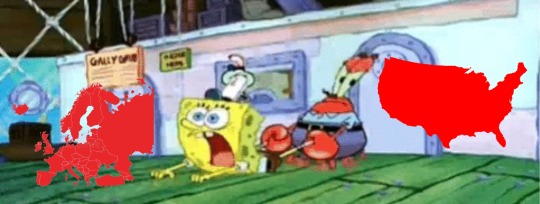
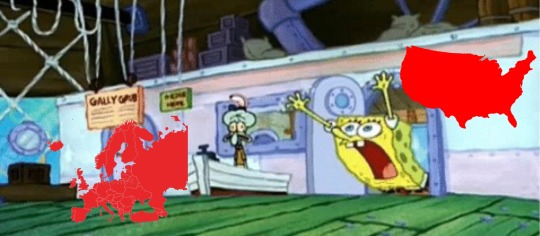
#a part of me if glad to be headed home. i miss my country and family. but goddamnit i have my whole life to see it!! i wanna see more!!!#you can’t drag me across europe and the middle east for three months and just expect me to go home and go back to my 9-5 😭#i’m an european history major let me stay and learn more!!! fuck!!! 😤😢😤😢😩
5 notes
·
View notes
Text
Day 144: Going East
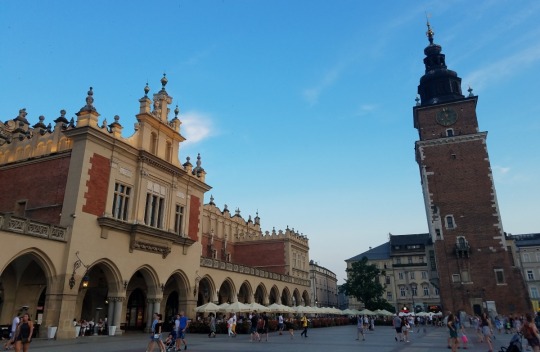
Today, after two and a half months in (mostly) English-speaking countries, it was finally time to dive back into continental Europe. And we'd be diving pretty deep--all the way over to Poland.
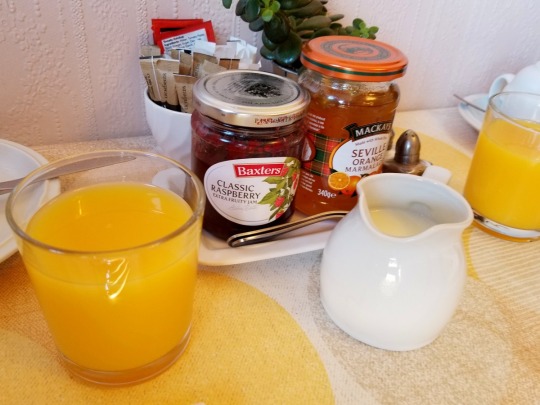
After our last British breakfast, we took a taxi out to the Inverness airport. Our flight was at 10:55, and our host had recommended leaving at 8:30 to make sure we had plenty of time.
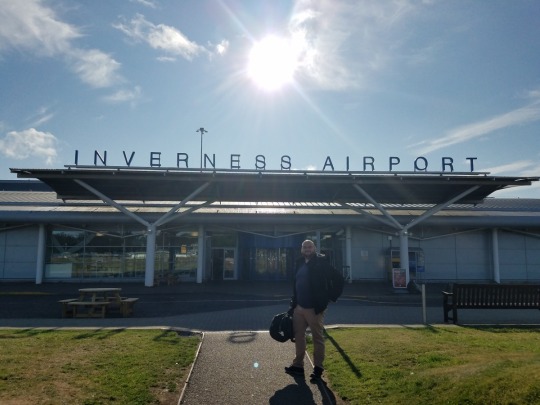
Back when we first arrived in Scotland, we'd thought that flying out of Dublin was as easy as it could get (not counting the Burger King incident). But Inverness was on another level. Checking in, dropping off our bags, and going through security took less than 15 minutes total. That left us plenty of time to browse the airports impressively stocked whisky shop and admire the airport's three gates. Not three terminals--three gates.
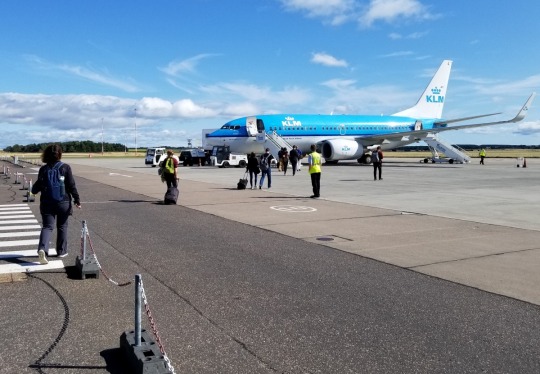
Our flight was with KLM Royal Dutch Airlines and included a layover in Amsterdam. We were a little nervous about the layover because it would only be 35 minutes long. But the tickets had all been booked directly through KLM, so we figured that we could trust their judgement.
It worked out, but I’m not so sure about their judgement.
Our flight from Inverness actually left early, and we arrived in Amsterdam over ten minutes ahead of schedule. Which was a very good thing, because we were at the far end of one terminal while our next flight was at the far end of the opposite terminal. And half of the moving walkways were out of service. And we had to go through passport control.
There was a fast-track lane for short connections at passport control, but an attendant told us to go into the main line anyway. This wasn’t an Inverness or even a Dublin line–this was a major-international-hub line. After waiting in this line for about ten minutes, our mental math was raising red flags. We would have a hard time getting through the line before our flight took off, let alone getting all the way to the gate, which was still a considerable walk beyond the passport control desks.
Just as we were getting ready to ask again, another attendant came up and shouted for us to get over into the fast-track line.
Passports stamped, we speedwalked straight to the gate, bypassing several badly needed bathrooms, and only just made it to the gate at the scheduled opening time. If our plane from Inverness hadn't arrived early, we might not have made it to our gate even if we hadn't gotten stuck at passport control.
Luckily for us, our next plane was also late, so we had time to use the toilets and grab a cold beverage from a vending machine before hopping on the bus that took us to our plane. It was smaller than the plane we took from Dublin to Edinburgh, but it did have jet engines instead of turboprops–so I still count it as an upgrade.
The flight was smooth, and soon enough we were stepping out into Krakow's John Paul II Airport. We decided to get some Polish Złotys (pronounced “zwah-tes”) from the airport ATMs (or "Bankomats") before hailing a taxi from into town. We ended up withdrawing way more money than we needed--the interface had been designed to make it look like you couldn't pull out smaller amounts unless you looked closely.
As it turned out, we probably would have been better off skipping ATMs in Poland altogether.
I always imagined Eastern Europe as a very cash-based place, but that couldn't have been further from the truth--at least in Krakow. Everyone there seems to use credit cards for everything. Spending the 100zł bills that we'd gotten from the ATMs (worth about $25 US) was nearly impossible. Even at large grocery stores and tourist sites, the cashiers would just shake their heads and smile at us condescendingly as if we were simpletons trying to pay with rocks.
We eventually went looking for a bank or currency exchange that would break some of our larger bills for us and gave up after a frustratingly unsuccessful hour of searching. Two of the currency exchanges (or "kantors") practically laughed us out of the doors.
I have to admit that I got angry once or twice over this odd phenomenon. There are ATMs everywhere in Krakow. How is it possible that everyone is using them when the money they dispense is worthless?
It actually seemed like there was a shortage of small bills and coins going on. When I tried to buy 41zł worth of groceries with a 50zł note, the cashier was visibly distressed at the prospect of having to scrounge together 9zł in change. When Jessica managed to rustle up a 1zł coin from her wallet (bringing the change to a single 10zł bill), the cashier's face lit up with relief and gratitude.
All of this wouldn't have been a much smaller deal if my credit card hadn't stopped working back in Scotland. We never figured out why, but at some point my credit card's chip had gotten corrupted and slowly started working less and less reliably. By the time we reached Krakow, it had stopped working altogether. I eventually got comfortable using Android Pay at places that took it, but Jessica ended up making most of our in-person purchases for the remaining two months of the trip.
But all of that was still ahead of us in the coming hours and days. For now, we happily made our way to the airport taxi stand with cash in hand and got a ride into town.
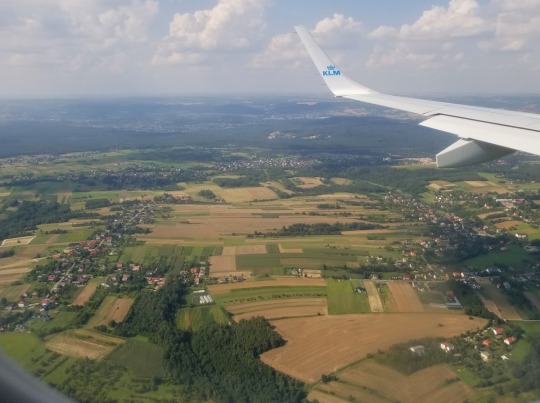
The first thing that struck me about Poland–and I noticed it from the airplane window before we even landed–was the totally unique landscape. I’ve seen forests, farmland, and urban sprawl before, but never mixed together quite so thoroughly. On the 30-minute drive from the airport into town, we passed through dense forests, low-density farmland, and a wilderness adventure park. Even in the suburban periphery of the city, apartment blocks are separated by cornfields as well as vacant lots.
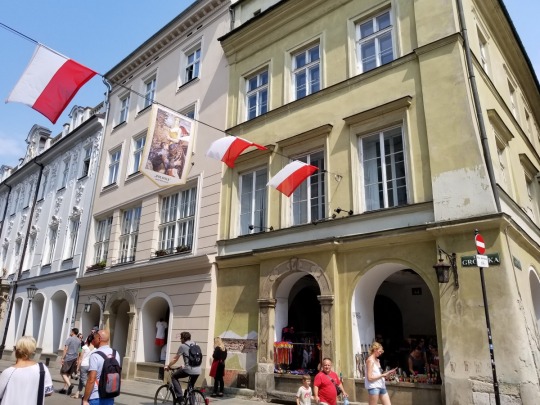
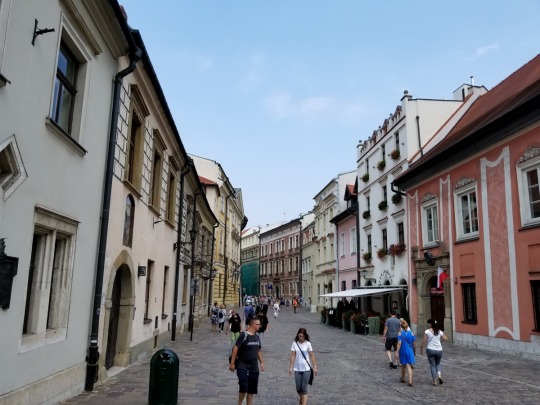
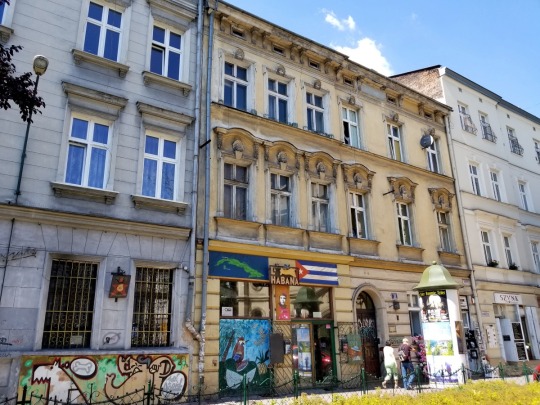
This patchwork aesthetic extends to the architecture of the old city itself. On any given street, the buildings form a mosaic that tells the long and turbulent story of Poland’s past, from the middle ages through the 21st century. Many struck me as ironically eastern European, with inward-sloping buttressed walls and steep, almost pagoda-like roofs. Others looked straight out of Renaissance Venice or Imperial Vienna. And, of course, there are the Brutalist mementos of Soviet austerity.
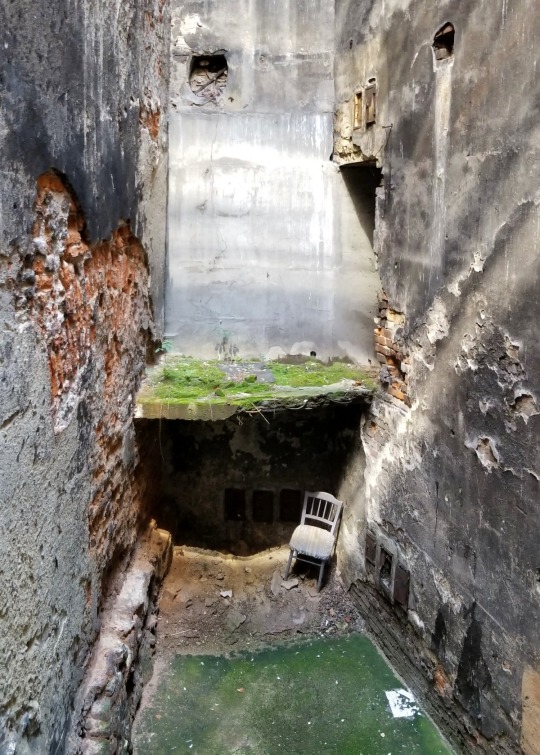
What holds it all together is a charmingly rough-around-the-edges spirit of making do with what you have. Concrete walls patched with plaster, plaster walls patched with plywood. Walking down an alleyway between two buildings, you might tread on tile, cement, and gravel all in the space of thirty yards.
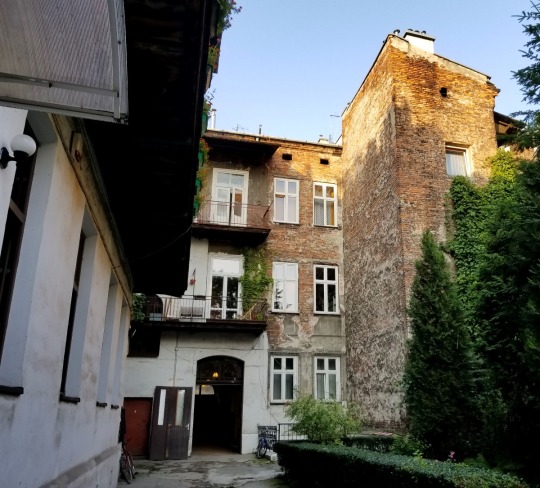
But this is not a third-world country. Enter into one of these unassuming domiciles, and you might find a surprisingly luxurious abode.
Like ours.
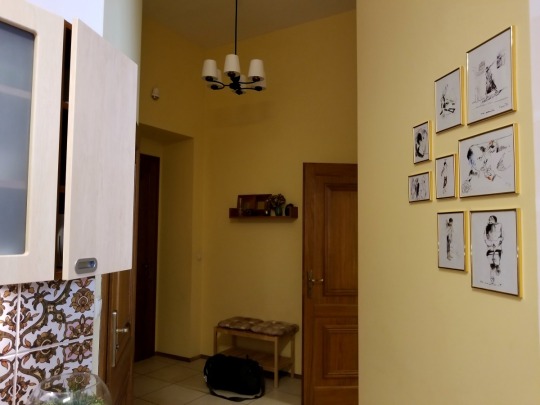
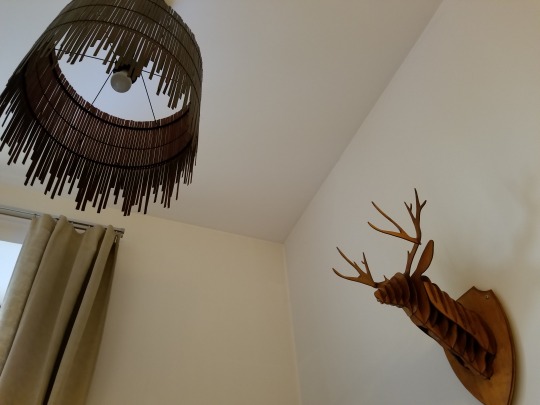
Poland is not a wealthy country. But that means that a little money can go a long way. And while you may trip on a pothole or slip on a patch of sand outdoors, you can come home to a bathtub bigger than any I’ve enjoyed in the States.
The second thing I noticed about Poland are the people. They are both the most reserved and the most outgoing people I’ve met in Europe.
Professionally and in public, everyone is just a blank face in the crowd. Our taxi driver from the airport did not make a single attempt at small talk the entire ride (not that I’m complaining!), and shopkeepers have no trouble flatly declining to assist you if you ask for something they don’t want to do.
But if you engage them personally, as a friend, guest, or tour companion, you’ll have trouble getting a word in edgewise as they talk your ears off with kind enthusiasm, sincere questions, and thoughtful advice.
Obviously, this is a stereotype and doesn’t apply to everyone in Poland. But it’s exactly what Jessica–who spent a summer here in 2010–told me to expect, and it’s exactly what I’ve experienced.
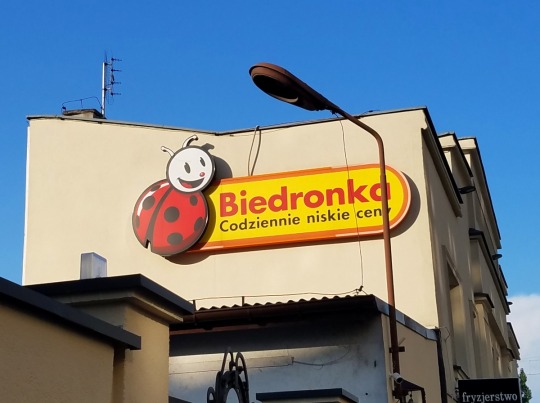
Another funny quirk is that two of Poland's biggest chain stores are named after animals. The main supermarket chain is called Biedronka, which means ladybug, and the main convenience store chain is called Zabka, which means frog.
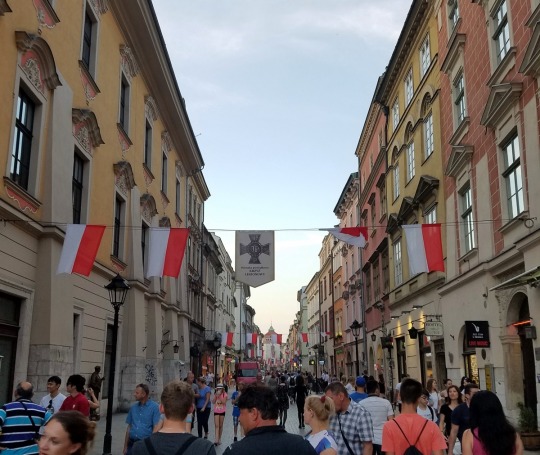
After checking into our Airbnb and stocking up on groceries, Jessica could hardly wait to take me into the old town. Rick Steves says there isn’t a better city in Europe for just wandering around in, and I can’t say I disagree.
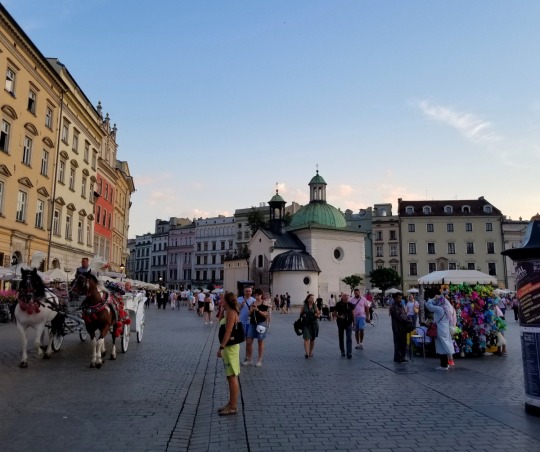
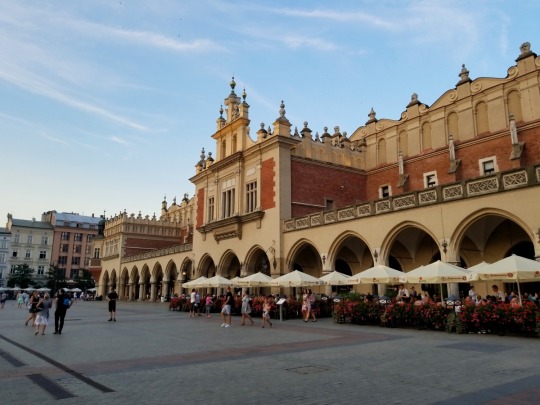
The main market square is spectacular–like Venice’s San Marco Square and Madrid’s Puerta del Sol rolled into one.
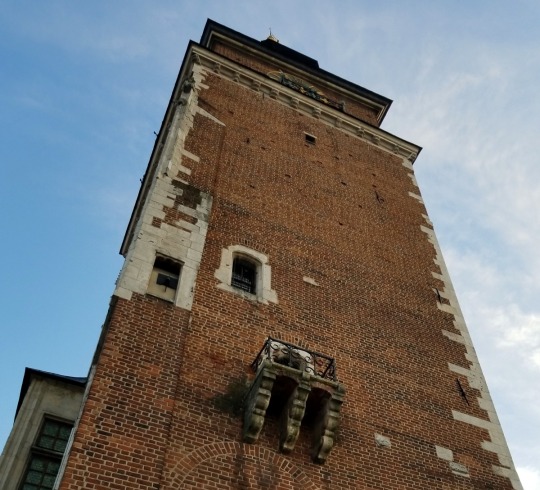
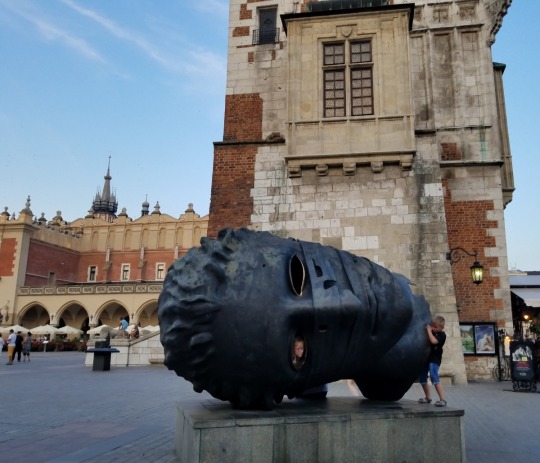
The old Renaissance merchant hall dominates the center of the square, and St. Mary’s Basilica stands proudly overlooking its northern corner.
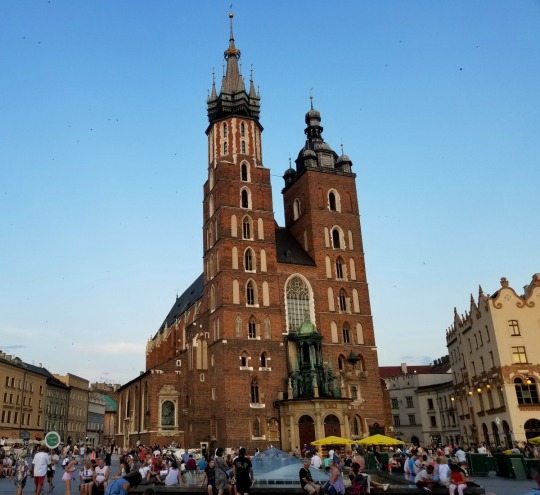
Technically, the church only has one tower. The taller tower on the left–the one with the crown encircling its spire–is officially a city watchtower. According to legend, a 13th-century watchman was struck silent by an enemy arrow in the middle of trumpeting an alarm. Now, every hour on the hour, a trumpeter plays the same traditional anthem almost but not quite to completion in his honor.
The curtailed call is also used by the Polish national radio broadcaster, so it is a familiar sound across the country.

After taking a peek inside the market hall and up at the nearby clock tower–the remains of an otherwise-demolished medieval city hall–we meandered up the main road to the barbican gate–one of the few remaining parts of Krakow’s medieval walls.
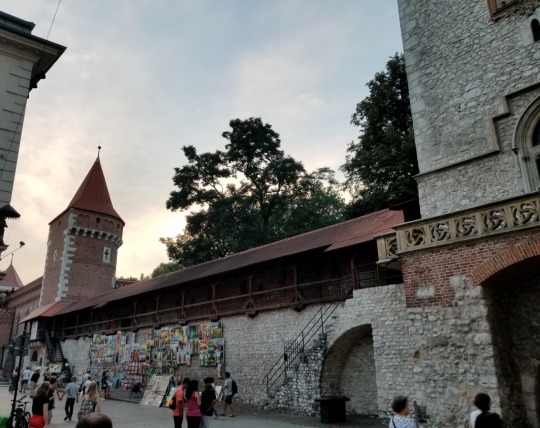
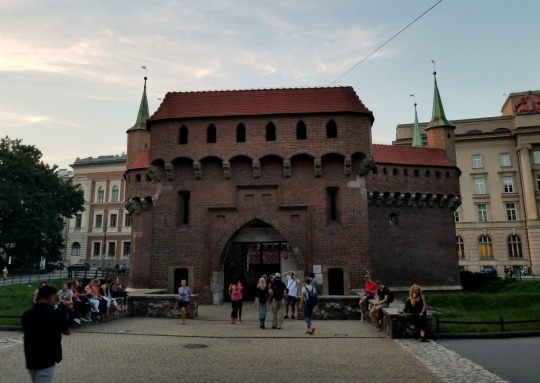
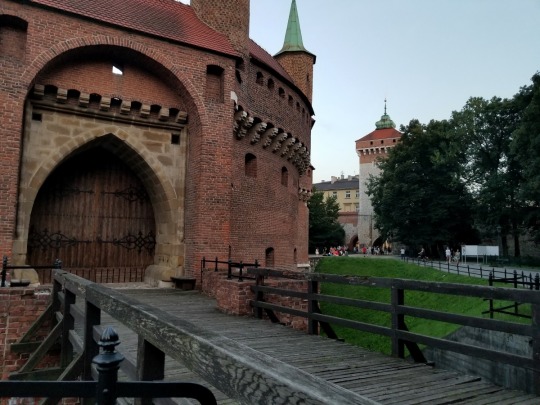
Unlike the many European cities that turned their medieval walls into ring roads, Krakow turned their walls into a green belt surrounding the old city center. Like many Polish names, it was unintentionally amusing to us as English speakers--Planty Park.
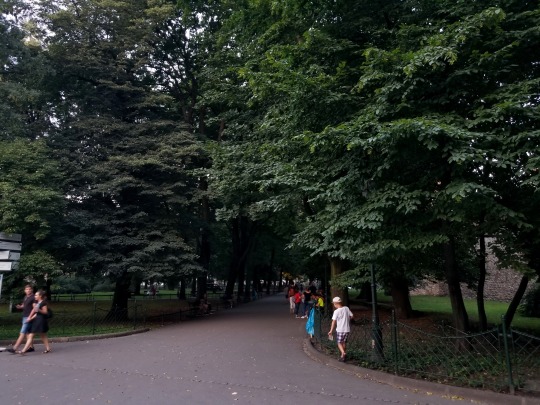
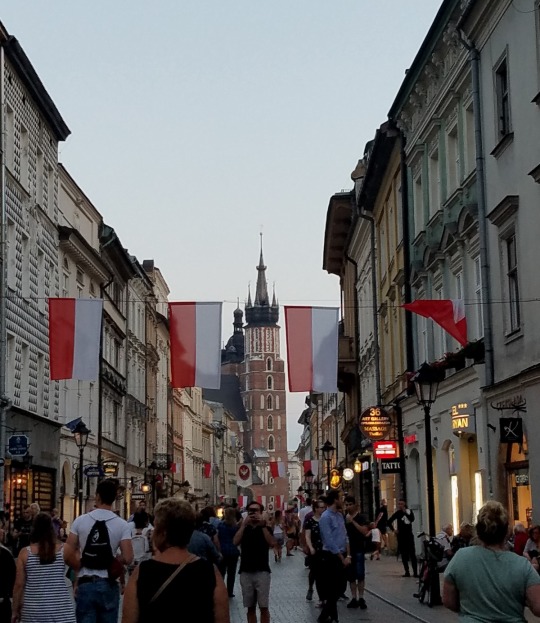
As we walked back down the main tourist drag, Jessica noted how much the place had changed in just the past eight years. A local café she'd wanted to take me to had been replaced by a Starbucks, and there were a lot more ethnic restaurants than she remembered seeing before. Though not all of them looked especially authentic.
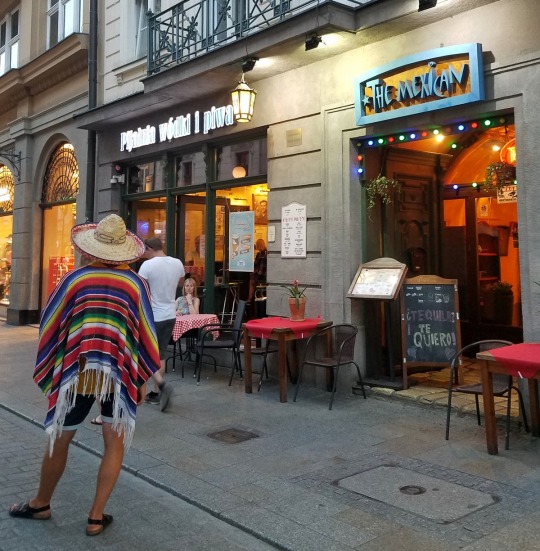
Tired and thirsty, we headed back to our flat after stopping for drinks at a Zabka along the way. It was a warm night, but thankfully the windows were big and opened wide. As much as I had feared a culture shock, and our currency-related annoyances notwithstanding, our arrival in Poland had been surprisingly smooth. We were comfortable, well-fed, and excited to see what the city had to offer.
Next Post: Schindler’s Factory and St. Mary’s Basilica
Last Post: Resting Up (Markets, Museums, and More Pizza)
1 note
·
View note
Text
How to build bridges
"Wait two secs, Dad; I haven't got my wallet." Despite lengthy preparations to ensure a smooth departure, it just wouldn't be the same if we were away on the first attempt. Although I can't see him as I make my way back inside, I know Dad is shaking his head and frowning; he's going to tell me once again that I should keep my wallet in my pocket. Minutes later, after locating my wallet somewhere, I'm dancing spasmodically into his Fairlane Ghia, the quintessential Australian Executive's car, slapping my chest and pant-pockets as one final check I have all I need. Dad knows I like to drive his car. It's not often that I get to drive a car built in the 1990's, so he lets me drive it at any opportunity. Perhaps he thinks it will motivate me to get a real job, one that will enable me to afford a real car. As I have two hours of driving ahead of me, I adjust the seat, steering wheel and mirrors and press play on the CD player. Finally, we're on our way. * * * You wouldn't suspect by my face and accent that I have a name that's close to unpronounceable. Go on, try it; “Olszewski". Phonetically; "Ol-shev-skee", not "Ol-zoo- skee" or “Ol-ze-wez-skee" or any other derivative you pull out of that Anglicised linguistic lucky-dip. Just in case you were wondering; it's Polish. Sometime during Primary School, I started using the nickname “Ozi"; covertly stolen from my cousin, John. I idolised John because he was a footballer, a drummer and an Olszewski. All his mates called him "Oz" so, from then on, all my mates called me “Oz". As I was only nine or ten at the time, the theft of my cousin's moniker was puncalculated. But retrospectively, it was an attempt to hide my otherness. First names didn't exist in Primary School and my surname just didn't cut it. I was true blue. I had blonde hair, blue eyes and olive skin. At lunchtimes, I played footy with kids who had names like Christie, Linley, Sutcliffe and Wilson. Somewhere else in the schoolyard, boys with names like Moratis, Georgio, Karifilowski and Ligavic played soccer. They were wogs. They had brown eyes, dark hair, weird lunches and surnames like mine. I wasn't a wog; do I look like a wog? But because of my name, not including the time I had the shit kicked out of me by five Greeks, I was never a skip, either. * * * "Come on, come on Sardoola! Come on! Please." It is September the 1st 1939. Irena, a girl less than a month shy of eleven years old finds herself, at her father's request, dragging the family cow up an unsealed road towards a paddock recently inherited by her family. Her Grandfather, her Dziadek, is Mayor of Krasna. Krasna is the Polish word for beauty, but it is also a minuscule village that lay on hilly plains in the county of Kielce, around 250 kilometres south of Warsaw. The Mayor was perhaps alarmed at the rate at which his son's family was growing. In the eleven years since his son's marriage, the boy had already fathered six girls and, what's more, there was another baby on the way! "Well, if you chop wood, chips fly." the Mayor would tell his son and daughter-in-law, but it was of no use - he generously passed on a small plot of land. Only trouble is, the paddock is miles from the farm, and poor Irena is struggling with the crowa, begging, dragging, grunting and coaxing it with clumps of grass to the point of exhaustion. It is because Irena is the eldest of the children that she has been given the difficult task of convincing Sardoola that she is not being dragged to slaughter but to a high hill of lush grass. It is the start of autumn, but the day feels like summer; nothing but heat, cloudless sky and the sound of insects in the light but constant breeze. The girl stops to rest. Peering across the plains, enveloped by green, she sees in the distance the Church tower of Krasna, the bridge over the River Tilica, the Swietrzyskie mountain range and the train line leading to places she's never been. * * * I was in Europe last year. I lived in London and from there I managed trips to Edinburgh, Dublin, Paris, Amsterdam and Munich. Sadly, I didn't have the time or money for Warsaw or Kielce or Krasna. In my dreams, I would have dropped in on distant relatives for a lunch of pierogi and kapoosta on my way from Scandinavia to the east. It wasn't to be. Poland remains a figment of my imagination. * * * "You know, you really should keep your wallet in your pocket, Son." "Yeah, I know Dad, but occasionally I might change the pants I'm wearing. Unfortunately, I have a habit of losing my wallet in that small yet scary fragment of space and time between pants." Dad doesn't reply. He's said it before. He'll say it again. I'll lose my wallet again. We 're on our way to Ballarat. More impressive (or is that oppressive?) freeways aside, I must have sat through the subtle delights of Victoria's Western Highway between Melbourne and Ballarat hundreds of times. The majority ofthese trips were taken during my childhood; Mum and Dad up-front of an orange Volvo Station Wagon, my three sisters bickering across the backseat over which music should be played, me in the back on the floor or bench-seat dreaming of drums, football and Babka's big green tin of Milo (Mum only let us drink Ovaltine or Akta-Vite; "Milo is junk food!"). After battling through the inner city, we saunter through Footscray towards Sunshine. 'I feel like I could do this drive with my eyes closed," I say to Dad just as a car in front of me slams on the anchors. I follow suit and come close to clipping its backend. "Looks like you already are." he responds. * * * Irena closes her eyes and points her face towards the sun. All she sees is red, but she listens. The insects appear to be growing louder. Or is that something else? She is shocked from her solitude with the realisation that the bug sounds have been replaced by the less restful drone of low flying planes. The planes are actually far away, an unthreatening distance, possibly ten kilometres, yet Irena is scared, for planes were not a common sight at Krasna. It is only when the bombs start to drop that she becomes thoroughly terrified. She makes for home, convinced her father will understand. Sardoola is only slightly more co-operative on the return, but Irena dares not leave her behind. So she struggles on as the planes only grow louder. She cannot help but cry. * * * I know jack about Poland. Babka and Dziadek did not speak English very well and I was neither interested nor patient enough to sit through stories of home. I was much closer to Babka than to Dziadek, but she died when I was ten. Such questions don't occur to children. Dziadek died when I was nineteen. We hardly spoke in the years between. Why is it only now I notice the gap in my identity their passing has left me? My regret for not asking them more is so tangible, I have no choice but to make amends. * * * I'm not sure why they call it Sunshine, as I've always thought it was one of the dullest parts of Melbourne. Dad, who lived here when he first came to the city, informs me it was named after The Sunshine Harvester Works. The Sunshine Harvester was one of Australia's most famous inventions; almost up there with the Victa mower. It was manufactured here and exported to the world. So great was the global demand for them that, early last century, the works periodically carried the title of "World's Largest Production Line." Then the Americans bought it and turned it into a suburb. Dad worked in Footscray and played footy in Maidstone, so Sunshine was easy and cheap. After the credit squeeze of the early 1960's, there was little if any work in Ballarat for young men, so the move to Melbourne was more of dire necessity than any country-boy-escapes-to-the-big-smoke-to-make-it-big type of idealism. Soon, we are on the open road just outside Deer Park (Were there once deer grazing here?), and we pass the zebra-stripes ofthe sadly disused but once famous Melbourne Lion Safari Park. When I was small, I would always look out the window in fruitless hope of spotting a pride frolicking beside the highway. Today there's just signs advertising suburbs yet to be built. I reckon they should call one of them Safari. I'd live there. * * * "Irena, come quickly!" It is Jozef, Irena's father. Her hope for comfort in her father's arms is lost; in all her life, she has never seen him so scared. "Get inside the house! Give me Sardoola!" Irena runs to the house without looking back. All she wants is to cry and hide from the world, be safe by her mother's side. "Mama, what is happening?!" Karolina too is frozen with fear, and prays aloud for the strength she wants to give her daughter. "I don't know, baby; just go hide with your sisters under the bed. Now! Go! I will be there soon." Irena does not find solace until she is under the big bed, where she finds Helena and Fredrica comforting Daniella and baby Zofia. The four sisters huddle together crying and watching their mother's frantic feet. Karolina is packing for an escape. * * * Did you know that in the 16th century, in a union of Duchies with neighbouring Lithuania, Poland was a leading power in Europe? No? Neither did I. The union stretched from the Baltic Sea in the west to the Black Sea in the east. Unlike other barbaric international activity of the period, this union was achieved by diplomacy not war. Together, they controlled the gateway between Europe, Scandinavia, Asia and the Middle East. Poles refer to this period as the "Golden Age", striking cultural, political and social resemblances with Italy's renaissance period. It was also at this time that Poland first gained its reputation as a champion of democracy and liberalism in Europe, introducing an elected monarchy as early as 1572. Parliamentary procedures established in the Sejm, the people's house, required a unanimous vote. This meant minorities were better recognised and represented than anywhere else in Europe or the East; that buzz-word of the late twentieth century, multiculturalism? These guys had it down pat centuries ago. Nearly every diaspora was represented - more salad bowl than melting pot. So reads The History of Poland, by Mieczyslaw Kasprzyk: "Poles in the wars and centre, Lithuanians, Latvians and Estonians in the north, Lutheran Germans is Prussia and the western frontier, Orthodox Ukrainians and Belorussians in the east, Moslem Tartars in the east (these are the oldest Moslem communities in the Christian world) alongside the Karaites (a mixture of Khazar and Kiptchatska-Polovetska peoples practising a unique mixture ofJudaism and Islam), and Jews scattered throughout." Not that I've ever heard of Karaites or the Khazar or the Kiptchatska-Polovetska peoples, but there you go. While all this worked in the alliance's favour, it also earned Poland and Lithuania disdain from some parts of the world, labelling the union as a "Paradise for Heretics". It wasn't long before somebody picked a fight. * * * Cruising out of the suburban sprawl, the little boxes give way to tides of green circled by distant mountains. I imagine County Kielce looked something like this, if not for the neon service-centre-dotted six-lane highway that cuts these plains in half. Dad turns the music off and tunes to the ABC. We just passed Melton, built in the 1960' s as "Australia's first satellite city", which translates to me as "Australia's first unhinged suburb"; it only pre- empted the sprawl. We then continue past Bacchus Marsh, and in-dad's-expensive-car cautiously through Anthony's Cutting, a man-made gash in the landscape. Before the freeway, single-lane Old Ballarat Road passed through all these towns. The drive took longer, but there was more time to take in the sights. Usually it was just a pub, a general store, some sheep, a hay bail, a barn. But then something would break the monotony - just outside the tiny town of Wallace, two plastic dinosaurs in the middle of a forest. No wonder I loved the trips to Ballarat so much as a child. Maybe there were no lions, but there was always the hope of them. And then there were dinosaurs. And castles, too. Just you wait and see ... * * * The planes grow louder. Jozef and Karolina eventually join the girls under the bed of the farmhouse's only bedroom. Here the Olszewski family stays until the whine of the bombers subsides. Although the planes were close, it appears Krasna has been spared from this blitzkreig. The subdued sound of Autumn returns, as if a bomb had never fallen, but Jozef insists the family stays under the bed while he checks outside. Outside, he finds his neighbour, Mr Kalitzski, looking towards a horizon obscured by smoke and fire. "It won't be long before those German pigs are here, Olszewski. We should take our families and leave. Immediately." Jozef had anticipated his old friend's concern, and Karolina has already packed what food and supplies she could, throwing some bread and sausage, a few utensils, cups and plates into a large milk-pail. But Jozef was not sure how long his family would have to be in hiding. After quickily gathering and calming the children, he asks Karolina to make sure the girls have warm clothes, their shoes and jackets. "Make your way to through the forest behind the house to the next clearing. Wait there for me. I will not be far behind you." "But, where are you going?" "The crowa's coming too." * * * Somewhere between hearing the eleventh and one hundredth replay of Cathy Freeman winning her Olympic Gold Medal, Dad and I talk about Poland. Holding the steering wheel with my right hand, I reach behind the passenger seat, ("Mark," Dad says the way only a parent can, 'What are you doing!?"), I show him a book I've been reading by Polish writer Ryszard Kapuscinski. I am not sure who was more surprised; me on hearing Dad had never read let alone heard of Kapuscinski, or Dad on hearing that I had. I promise to lend it to him one day, proud of myself that I could introduce him to a piece of Polish literature. As long as I can remember, my Dad would always have a book at arms-length; if it wasn't about sport it was usually a history book - a book about Poland, or a book about war, or a book about war in Poland. Dad never lived in Poland. He'd read the books studiously, like he was trying to catch up; much like I read them now. * * * I dream up this scenario where Ryszard Kapuscinski is commissioned to write a travel journal in Australia. He visits Melbourne, Ballarat and the dinosaurs near Wallace. But in this particular scene, he finds himself in an outback Aussie pub, exchanging vodka-fuelled ramblings with an indigenous Australian. "Mate, we've been here 40,000 years living peacefully, and the white man rocks up two hundred years ago, takes our land, takes our wives, takes our children, gives me his diseases, gives me his drugs and totally destroys my culture in the process." Kapuscinski is half-drunk, his English a little stunted, but a surly Pole will always go one better. "My friend, five years after those Englishman invaded your land, my land was taken from my people too. This despite them being welcome to join us in peace centuries before. Back then, Poland would have anyone and everyone. But in the interim, all these men - Turks, Mongols, Cossacks; you name it - invade from every direction. Finally, white men from the north, south and east chop up our land and divide it like pie between them; Austria, this bit, Germany that bit and that other bit for Russia. Borders everywhere, all on or own soil! Poles are slaughtered, raped, assimilated. No Polish books or language, no Polish songs! We even ended up fighting the world's wars against each other - all for these invaders! - then twenty per cent of our already decimated population is taken to die in Siberia or gassed or shot in the back and bulldozed by the SS, only to leave the few survivors oppressed by a corrupt and undemocratic communist regime. God, we really only got our identity back ten years ago. So don't even get me started." The Indigenous Australian is a little surprised, perhaps humbled. Kapuscinski has impressed even himself and, satisfied he's had the last word, moves to turn in for the evening. But the Aussie has one up his sleave. "At least the Germans and Russians had the balls to say sorry. Not like our bloody government." A sucker for a heated political conversation, Kapuscinski defeatedly orders another Vodka. * * * Kryall Castle lies at the base of the wooded Mount Warranheap on Ballarat's eastern outskirts. As a child, I imagined a great King lived behind the blue stone walls. He ruled Ballarat and protected my family. The fantasy ended when, after years of begging my parents, I discovered the blue-stone did not conceal a secret order of Knights, but a mediocre theme park. Yet the walls of Kryall have marked my arrival in Ballarat for as long as I can remember. The extended left sideward glance at its replica towers is an essential part of the journey. Even if just for a second, it takes you to another place. * * * Irena and the girls are happy to see Sardoola trailing behind their father as he emerges from the Alder trees. Now the whole family is here. Together, they move deeper into the forest, where they find nearly all the families of Krasna taking refuge. Materialising from a crowd of anxious faces, the Mayor displays a mixture of astonishment and admiration on realising his son's family has a cow in tow. Irena does not remember the last time she saw her father and Dziadek embrace. As the afternoon relents to dusk, the residents of Krasna pull together, pooling food, lighting fires and building shelters while consoling each other with mutual lies. Irena, Fredrica, and Daniella rest that night on moss, peering over a shared blanket at Jozef and Karolina cradling Zofia in the firelight. They fall asleep in a world transformed. On the other side of the forest he had hunted rabbits in as a boy; now, sitting lonely against the trunk of the tree that gave him his name, Wladyslaw Olszewski, Mayor of Krasna, curses through teeth clutched to a smoking pipe. "Another bloody war! Did you not hear my prayers this morning?!" It is only eighteen years since Wladyslaw got his country back; eighteen short beautiful years in which to work a land blood-stained by the world; eighteen happy and rewarding years to raise a family and community, to celebrate a culture of diversity that, with and without God, had withstood three centuries of occupation and attempted obliteration, only to start again. Like it's starting here. Now. Not more than five kilometres away, German tanks are rolling through Krasna. * * * Possibly as some sort of boredom suspension tactic, my parents would often encourage us to give names to the sights we came across on our road trips. Just as you come down the last hill to enter Greater Ballarat, there is a rusting, unassuming rail bridge on the right hand side. If you blink, you'll miss it. We called it Babka's Bridge and it has as much if not more significance to me than that coathanger next to the Opera House. So too with Dziadek' s Bridge, on the other side of town. His is the grand white archway that opens Ballarat's Avenue of Honour. Another extended sideways glance. Once again, these naming games were simply a case of kids being kids. We didn't know Babka had caught military trains alone across Germany and Poland at the height of World War II. We didn't know about all the soldiers that Babka and Dziadek helped during and after. the war. We just named them because they were there, and as far as us kids were concerned, Ballarat was Babka and Dziadek's town. We didn't go to Ballarat to go toSovereign Hill or Euxeka Stockade, we went there to see Babka, Dziadek, our Aunts, Uncles ,cousins and eat Polish food, which we rarely ate at home. In a way, we were going to our own little Poland, just a few hours drive from home. But there was never any war there. Even on the Avenue of Honour, war was the last thing on our minds. * * * Kasprzyk has an abridged, though no less arresting version of what happened to Poland in World War II: "Over half a million fighting men and women, and 6 million civilians (or 22% of the total population) died. About 50% of these were Polish Christians and 50% were Polish Jews. Approximately 5,384,000 or 89.9% of Polish war losses (Jews and Gentiles) were the victims of prisons, death camps, raids, executions, annihilation of ghettos, epidemics, sanitation, excessive work and ill treatment. So many Poles were sent to concentration camps that virtually every family had someone close to them who had been tortured or murdered there." None of my family died. They don't know anyone who was murdered or tortured in a concentration camp, even the Jewish family that lived in Krasna. I don't know how they did it. * * * At the end of the war, a German munitions train was destroyed on the bridge at Krasna. One of my distant cousins found a hunk of train in the forest. It must have been a hell of a blast to throw debris that far. Needless to say, the bridge was destroyed. * * * We arrive at my Uncle John's to a feast of salami and tomato sandwiches. Dad tries some kippers from a can. I try some of Auntie Danka's pickled mushrooms. They're ... not bad! We're running late for Auntie Irene's and eating in a fashion that suggests we haven't had a meal in days. Dad hasn't caught up with his brother in a while and it occurs to me how many of these bonding sessions must have taken place involving sandwiches like this. I've been involved in quite a few of them myself. For some reason, Dad appears younger when he is around John. On a slow drive around Lake Wendouree, we talk about their life in the 50's when they first came to Ballarat, about doing it tough as ''New Australians", about fights and football, about fishing and rabbit shooting, about slingshots, about hiding from the police in the backblocks, about getting away with it. It's all that teenage stuff your Dad did that you wish you had as ammunition when you were a teenager. But it was also about getting through it all and coming out on top. The Olszewski's war didn't end in 1945. Soon we will be at Auntie Irene's. There I will meet Auntie Daniella (Danka) and Auntie Zofia. There are already a thousand stories racing through my head, now I will get to hear theirs. * * * In my childhood journeys, Auntie Irene’s would always be the last stop on the itinerary. Her house was like a magnet. Somehow, all the relatives we had visited during the day would regroup in her kitchen and dining room by late Sunday afternoon. The men would sit in the dining room and talk in Polish, smoking cigarettes, downing shots ofvodka, and, I can only assume, comparing notes on the gentle art smoking eels, a life-long obsession of Irene's husband, Frank. The women, also smoking, congregated around the kitchen table.mPerhaps for their brother's wives' sakes, they would predominantly speak in English. The conversation would normally revolve around which Olszewski is to be married, or which Olszewski is expecting. This was at a time when I knew everyone of my cousins. We would all play together at family gatherings, enough of us for a backyard cricket match that would last hours. But as the family grew and multiplied, as cousins had second cousins, and second cousins got married and had third cousins, it became increasingly hard to keep up. Now, I have cousins I have never met. Olszewskis are very good at chopping wood; at making chips fly. * * * I'm sitting at Irene's kitchen table, drinking beer and stealing full strength Marlboro's from John. Irene floats around the kitchen preparing yet more sandwiches. The smoke is thick and my Dad complains, eventually giving in and having a cigarette himself. Irene takes a seat commenting on how thin I look. Again. For the next four hours, I am taken back to Krasna. I feel the sun on my face. I see the hilly plains and the church tower. I see a young girl leading a cow. I hear the insects and then the planes. I see the falling bombs and the frightened citizens. I hear my family's cries. I escape with them to the forest. * * * I only tell this story because my family survived. How they did it would fill hundreds of pages; another story to be told. This story is about my journey, a journey to the self. It's also about a lesson learnt - never tear a bridge down unless you know how to rebuild it. Just one more thing; don't call me "Oz" anymore. My name is Olszewski.
0 notes